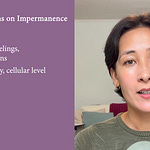The first workshop of the Engaged Buddhist Studies Seminars is now available for replay. If you’re interested in watching, you can upgrade now and join in on the next workshop, book club, and (soon to start) weekly meditation gatherings. A free preview is available above if you’d like to get a sense of the class
Dear friends,
I am sharing the replay from this past Sunday’s workshop on Socially Engaged Buddhism. If you’re a new meditator interested in Buddhism and social activism, this may be a helpful introduction to what “engaged Buddhism” is. If you’re a long-time practitioner, but want to experience a more academic workshop on engaged Buddhism as a movement, this also may be of interest to you.
In this workshop, you’ll learn:
The history, theory, and forms of socially engaged Buddhism (SEB)
Whether SEB is heresy or a valid translation of the dharma
Three leaders of SEB as it originated in 20th century Asia:
B.R. Ambedkar and Dalit liberation
Thích Nhất Hạnh and the Diem Regime
Master Cheng Yen and the Tzu Chi Foundation
How SEB has manifested in the West
How SEB practice can support radical political organizing
I believe it’s crucial we learn how engaged Buddhists in Asia have interpreted the dharma to resist oppressive social structures and authoritarian regimes, as this can help guide how we respond to our current political moment.
I find that Western Buddhist practitioners often unintentionally fall into the trap of Western hubris, which can prevent us from learning the ways Asian Buddhist leaders have translated the dharma to address their own political, social, and material realities.
During the workshop, I also highlight the need for Western Buddhist practitioners to be better informed about the fight for caste abolition. If you’d like to deepen your understanding of this issue, I recommend Thenmozhi Soundararajan’s book The Trauma of Caste: A Dalit Feminist Meditation on Survivorship, Healing, and Abolition.













